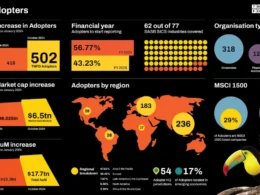A report revealed that around 4,300 EU funds with ESG or sustainability-related terms in their names may fall in the scope of European Securities and Markets Authority (ESMA) fund naming guidelines. Of 2,500 funds with stock holding data, around two-thirds (1,600) of funds may need to consider either divesting from the stocks or rebranding as they are potentially in breach of the guidelines.
A report issued by Morning Star Sutainalytics showed that if these 1,600 funds were to keep their names, it could lead to stock divestments worth up to USD 40 billion.
ESMA published its final guidelines on funds’ names using ESG or sustainability-related terms in May 2024 to protect investors against greenwashing risk and to provide minimum standards for funds available for sale in the EU that use specific ESG terms in their names. Under the guidelines, the funds must comply with new portfolio requirements or change names.
The requirements include a minimum of 80% of investments that meet environmental or social characteristics or sustainable investment objectives (80%) and exclusions set by EU regulation for Paris-aligned benchmarks (PABs), and climate-transition benchmarks (CTBs).
Also, funds with the key term “sustainable” in their names will need to invest “meaningfully” in sustainable investments, and funds using “transition” or “impact”-related terms are subject to specific qualitative requirements.
The report further highlighted that the sectors most affected by the potential divestments include energy, industrials (railroads, and defense, for example), and basic materials. The most affected countries would be the US, France, and China, in terms of market value, but China, the US, and India in terms of the number of companies.





















